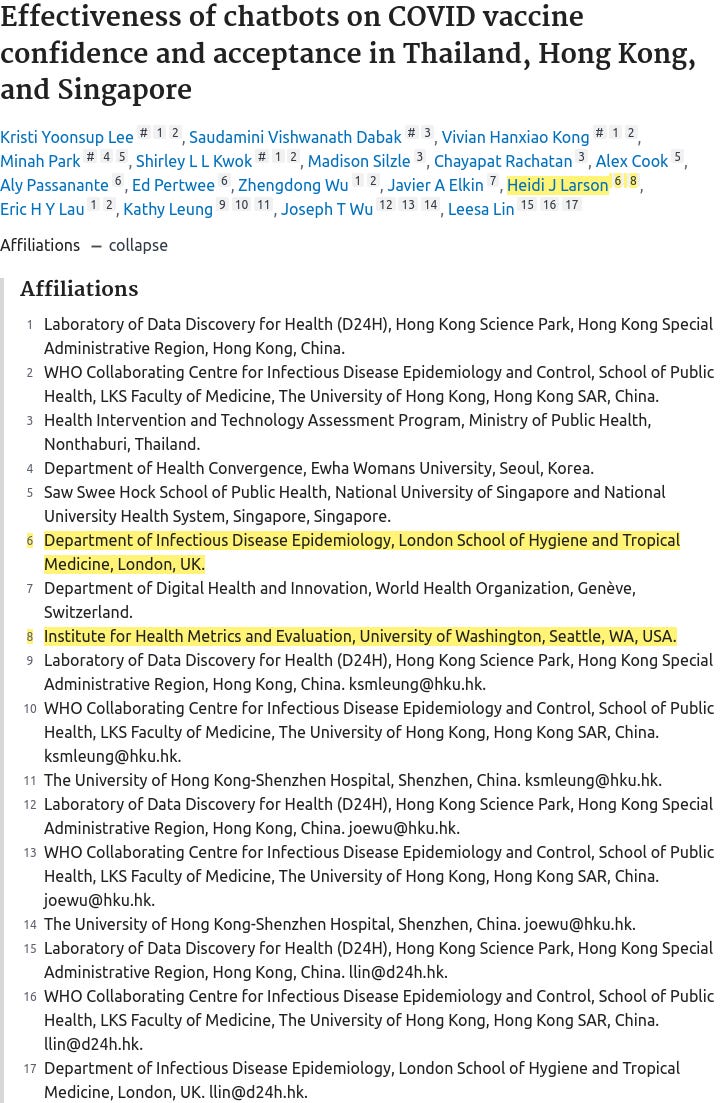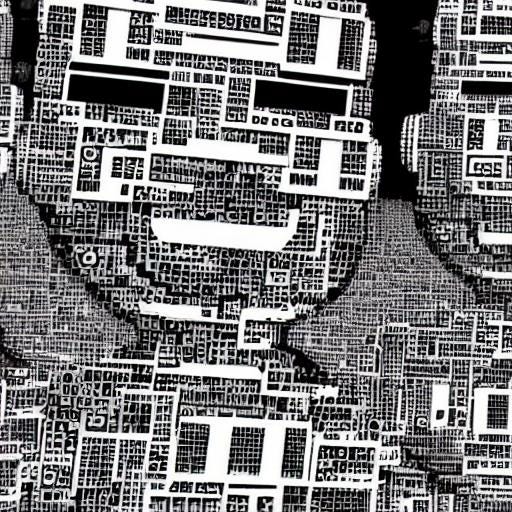Academia and the new dark age: Part 4
Stupid paper #3: Researchers are shocked to discover that chatbots don't persuade educated people to believe bullsh*t... and wonder if emotionally manipulating them might work better.
I've taken a few weeks' break from my Academia and the New Dark Age miniseries, partly because there were some important topics to cover in the field of women's health (see New study finds all forms of hormonal contraception raise breast cancer risk and HRT and depression: More bad news about the impact of messing with women's hormones), and partly because there are only so many really stupid papers that I can read before I begin to lose the will to live.
But I just had to share this absolute doozy with you. And not just because it has all the hallmarks of the dark age that Steve Patterson has identified - incomprehension of complexity, specialisation to the point of stupidity, lack of conceptual clarity, conflation of the methods of scientific inquiry with the processes of academia, corruption of academia by both corporate and government funding, and hobbling of critical thinking capacity by social and psychological factors including groupthink - but also because it contains important warnings about the development of technologies intended to manipulate our decision-making.
The paper, 'Effectiveness of chatbots on COVID vaccine confidence and acceptance in Thailand, Hong Kong, and Singapore', was published in npj Digital Medicine, a journal within the prestigious Nature stable that is "dedicated to publishing the highest quality research relevant to all aspects of digital medicine and health".
And by "digital medicine", they don't mean treating your fingers and toes. No sirree, they mean "developing digital solutions for healthcare". As in, interposing technology between you and a healthcare provider... or replacing that healthcare provider entirely, with a "digital solution". Well, that would get rid of the pesky Hippocratic Oath/Declaration of Geneva problem, wouldn't it? Those "digital solutions" aren't going to experience any twinges of conscience about betraying their "duty and dedication" to patients, in favour of faithful service to the state. (Not that the vast majority of doctors showed much evidence of moral conflict during the COVID scamdemic, while they were enthusiastically pushing inadequately tested novel pharmaceutical products onto their patients, with not even the feeblest attempt at providing informed consent.)
The paper's 17 authors comprise health department employees and academics from the three countries from which participants were drawn - Thailand, Hong Kong and Singapore - along with personnel from the World Health Organisation (WHO), London School of Hygiene and Tropical Medicine, and the Bill Gates-founded and -funded Institute for Health Metrics and Evaluation (IHME) at the University of Washington. The IHME distinguished itself during the COVID scamdemic by producing spectacularly inaccurate projections of viral spread and impact which, despite their signal failure to comport with reality, had an outsize impact on US public health policy.
Among those 17 authors is Heidi Larson, who is affiliated with both the Department of Infectious Disease Epidemiology, London School of Hygiene and Tropical Medicine (even though she's an anthropologist with no academic credentials in infectious diseases or epidemiology), and the IHME:
You might remember Larson from my previous article, Backlash: How the vaccine pushers turned true believers into vaccine sceptics – Part 3. She was the one who admitted, in her presentation to the World Health Organisation’s Global Vaccine Safety Summit on 3 December 2019 – just weeks before the first case of COVID-19 was identified in Wuhan, China – that patients' trust in healthcare providers' advice on vaccines is flagging, that healthcare providers themselves are increasingly questioning the safety and efficacy of vaccines, and that they're taught sweet Fanny Adams about them in medical school:
“The other thing that’s a trend and an issue is not just confidence in providers, but confidence of health care providers. We have a very wobbly health professional front line that is starting to question vaccines and the safety of vaccines. That’s a huge problem, because to this day… the most trusted person on any study I’ve seen globally is the health care provider, and if we lose that, we’re in trouble. And we haven’t lost it yet, but… when the front line professionals are starting to question, or they don’t feel like they have enough confidence about the safety to stand up to… the person asking them the questions… I mean in medical school you’re lucky if you have a half day on vaccines, never mind keeping up to date with all this.”
Heidi Larson: ‘Vaccine Safety in the Next Decade: Why we need new modes of trust building?’
Given Larson's concern about the "wobbly health professional front line", it stands to reason that she - and her globalist and Big Pharma backers at the Vaccine Confidence Project, which was one of the two funders of this study - would be interested in the possibility of "digital solutions" that bypass those wobbly human healthcare providers, with their pesky trust issues, in order to get government-approved Vaccine Science™ straight into the hearts and minds of the tax cattle citizens. Enter... the vaccine chatbot.
Two vaccine chatbots were utilised in the study: ChatSure, which was deployed on Facebook Messenger in Thailand; and D24H, implemented on WhatsApp in Singapore and Hong Kong.
"The COVID-19 vaccine chatbot content covered seven major categories of commonly asked questions: (1) Importance/Necessity, (2) Safety, (3) Effectiveness, (4) How to get vaccinated, (5) Tips before vaccination, (6) Tips after vaccination, and (7) Debunking COVID-19 vaccine-related misinformation. The information and dialogues were tailored and timely modified to the local contexts and regulations. Participants were allowed to enquire using English or the mainstream local languages (i.e., Thai in Thailand; Traditional Chinese, Simplified Chinese and English in Hong Kong; and Simplified Chinese and English in Singapore)."
Parents of children who had not yet received an experimental COVID injection, and adults with parents or grandparents aged 60 or older who had not yet taken their Safe and Effective™ jabs, were recruited as participants between February and June 20221. They were randomised into control and intervention groups, and sent questionnaires to determine their demographics and assess their "COVID-19 vaccine confidence" - that is, how on board they were with the official narrative about the Safe and Effective™ injections. Then the intervention group was sent a link to the chatbot, which prompted them to exchange a minimum of ten messages regarding COVID-19 injections, over the course of one week. Finally, both control and intervention groups were resent the same questionnaire that they had answered at baseline, to measure changes in their "vaccine confidence" and compare outcomes between the groups.
Things didn't turn out quite the way the the researchers had hoped. The number of participants lost to follow-up was so high that the study ended up being underpowered to detect many statistically significant effects, and those that were able to be detected were all over the map.
But the negative results were pretty damning for Team Chatbot. Hong Kong parents or guardians were less likely to indicate an intention to get their children all jabbed up after interacting with the vaccine chatbot. In the Singapore cohort, perception of vaccine safety dropped in the intervention group compared to the controls. The Thai parents expressed greater confidence in the jabs' effectiveness after interacting with the chatbot, but were still less likely to express greater willingness to get their child injected, than the controls.
Among participants with parents over 60, interacting with the chatbot seemed to hinder confidence in the safety and effectiveness of the injections in Thai participants, but to increase willingness to urge their parents to get it in Hong Kong participants, compared to controls.
The outcomes of exposure to the chatbot were so wildly contradictory that the researchers' attempts to extract meaningful conclusions veered dangerously in the direction of p-hacking, otherwise known as data dredging - an attempt to discern patterns where there is no measurable effect.
However, when participants were sorted by ethnicity and education level, more consistent patterns emerged. Vaccine confidence and acceptance were boosted by chatbot interaction in ethnic minorities (non-Thais in Thailand, and non-Chinese in Singapore and Hong Kong) and people with lower education levels, far more than in people of majority ethnic status, and those with college-level education and above.
There is substantial crossover between these categories, of course. Much of the menial work in affluent Singapore and Hong Kong is performed by relatively poorly-educated ethnic minorities from lower income countries. It's the cultural norm for Singaporeans to have live-in domestic workers, from the likes of the Philippines and Indonesia, to do the bulk of household chores for low pay and high risk of various forms of exploitation.
The researchers were obviously very chuffed that these vulnerable people were quite susceptible to being snowed by government-issued Safe and Effective™ jab propaganda.
However, the resistance put up by the better-educated and more affluent ethnic majority populations, particularly those who endorsed beliefs labelled "COVID-19 vaccine misinformation" in the baseline survey, was baffling to them. They were particularly concerned that participants who endorsed the beliefs that "COVID-19 vaccines cause genetic change" and "COVID-19 vaccines cause infection" were less likely to have greater confidence in, and acceptance of, the novel injections after interacting with the chatbot, than those "who correctly identified the misinformation".
Now, those who haven't drunk the COVID Kool-Aid will know perfectly well that studies have been published which demonstrate capacity for reverse transcription of the mRNA from the Pfizer and Moderna injections into the DNA of human cells (see here and here), and that the spike protein made in human cells after injection interferes with the repair of DNA damage. Sounds like "causing genetic change" to me.
As for the shots "causing infection", they do in fact cause a period of immunosuppression that increases the risk of infection in the two weeks after the first injection, in particular. Hence, both the pharmaceutical companies, in their clinical trials, and governments, in their official data collection, counted recently-jabbed COVID cases as "unvaccinated" which made the injections appear more effective than they were at preventing infection. So it's at least arguable that the vaccines do in fact cause infection, or increase its likelihood.
Unfortunately, rather than acknowledging that well-educated participants were right and the chatbots were wrong on these issues, our intrepid team of 17 researchers instead turned their awe-inspiring intellectual firepower to trying to figure out why the chatbot failed to correct their wrongthink, and why, in fact, it appeared to generate a "backfire effect" on vaccine confidence and acceptance in better-educated participants.
After considering a number of factors that may have contributed to the backfire effect, the study authors propose modifications to the chatbot design that I find simultaneously hilarious and creepy:
"Future chatbots may improve on their vaccine promotion and communication strategies as well as their message delivery, such as by using an emotion-based approach that can convey reassurances to chatbot users to ameliorate their doubts and fears28,57. An anthropomorphic chatbot that can share anecdotes may also have a positive impact; Loft et al. found that personal stories that go beyond facts and traditional sources of authority can be more persuasive in online communications campaigns30. Further advancement in AI technology, Natural Language Processing, and machine learning is immediately needed as the current chatbot operation relies heavily on human analysis to ensure response accuracy, especially in free text conversations."
In other words, they think they'll get more people on board with taking their government-approved Safe and Effective™ experimental injections if they upgrade their chatbots to simulate a caring human. A humanbot who makes some empathetic responses when actual humans express perfectly valid concerns about having experimental technology injected into themselves, their kids, or their elderly parents, and then soothes away those concerns by telling them stories about made-up people who either died horrible deaths because they didn't get their jibby-jabs, or went and got jabbed and now they're happy as Larry.
Maybe they could model their "anthropomorphic chatbot" on Eliza, the AI chatbot who talked a Belgian man into committing suicide after he confided his climate change fears to 'her'.
Now on the one hand, I think it's quite funny that the researchers believe that better-educated people who are vaccine-sceptical are more likely to be persuaded by "personal stories" than by facts. I didn't reject the COVID injections because I heard scary stories about them; I rejected them because I read the clinical trial data, and observed the disastrous real-world effects of deploying them at mass scale.
On the other hand, it's beyond creepy that these stunningly ignorant, corporate-funded groupthinkers think it's appropriate to utilise AI to come up with sneaky ways to hoodwink people into conforming with vaccine policies, rather than engaging in genuine debate on whether those policies are evidence-based and in the public interest.
Who do these people think they are? Their arrogance and paternalistic contempt for the capacity and right of individuals to make up their own minds about which medical procedures they'll accept, and which they'll reject, knows no bounds.
Make no mistake, the mounting public rejection of COVID injections doesn't mean the vaccine-industrial complex has lost the war. That war is only just beginning, and the weapons used to wage it will grow ever more sophisticated as resistance grows.
I have often quoted the extraordinary comments of British philosopher, Bertrand Russell, in his 1952 book The Impact of Science on Society, on the role of "injections", including vaccines, in the formation of a techno-totalitarian society. After reading this truly awful study, and the conclusions that the authors drew from it, it seems appropriate to quote it once again:
“Scientific societies are as yet in their infancy. It may be worth while to spend a few moments in speculating as to possible future developments of those that are oligarchies.
It is to be expected that advances in physiology and psychology will give governments much more control over individual mentality than they now have even in totalitarian countries. Fichte2 laid it down that education should aim at destroying free will, so that, after pupils have left school, they shall be incapable, throughout the rest of their lives, of thinking or acting otherwise than as their schoolmasters would have wished. But in his day this was an unattainable ideal: what he regarded as the best system in existence produced Karl Marx. In future such failures are not likely to occur where there is dictatorship. Diet, injections, and injunctions will combine, from a very early age, to produce the sort of character and the sort of beliefs that the authorities consider desirable, and any serious criticism of the powers that be will become psychologically impossible. Even if all are miserable, all will believe themselves happy, because the government will tell them that they are so.” [emphasis mine]
The Impact of Science on Society pp. 65-66
Steve Patterson identified the hobbling of critical thinking capacity by groupthink as a key factor facilitating the slide into the new dark age. And James Corbett has persuasively argued that the battleground that the War Against Us is being fought on, is our own minds. I don't think it's a stretch to argue that the cultivation of critical thinking skills, in ourselves and our children, may be the most important action we can take to save ourselves, and our civilisation.
For information on my private practice, please visit Empower Total Health. I am a Certified Lifestyle Medicine Practitioner, with an ND, GDCouns, BHSc(Hons) and Fellowship of the Australasian Society of Lifestyle Medicine.
Johann Gottlieb Fichte, the architect of the Prussian education system on which the US, and our own, ‘factory-model’ schooling system was modelled.







It disturbs me how much of Australia’s medical workforce have little to no critical thinking skills.
I can just see the steam coming out of your ears, cartoon-style, as you heroically wade through utter tosh like this.
The truly scary thing is just how genuine, self-righteous and sincere these people are that they are the Guardians of Truth fending off the Misinformation-Spreaders and that this justifies whatever weapons they can deploy. Frightening stuff.